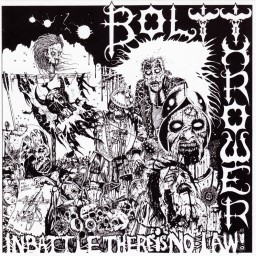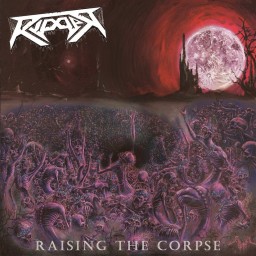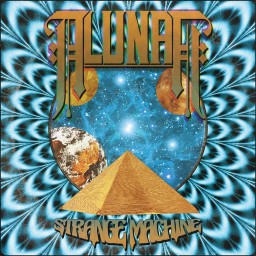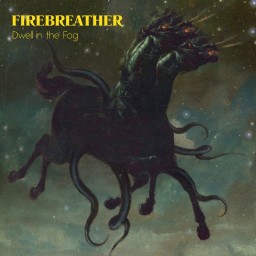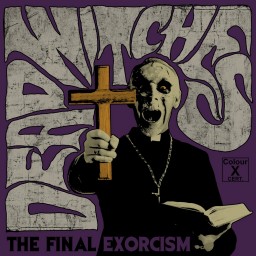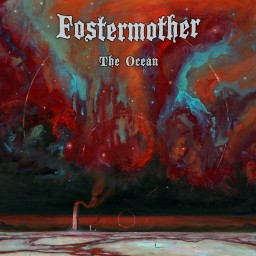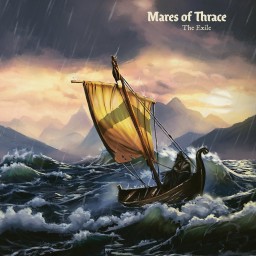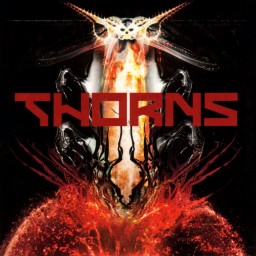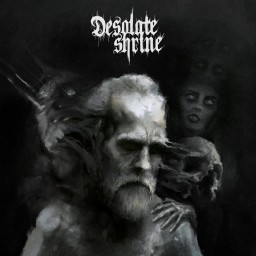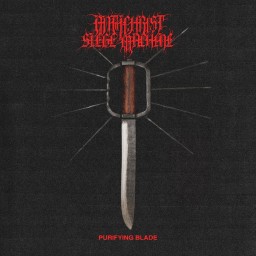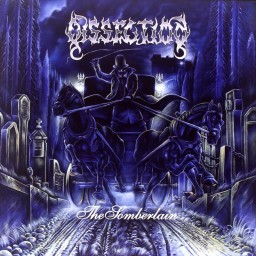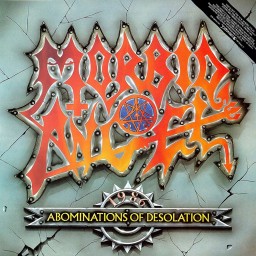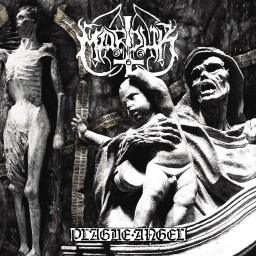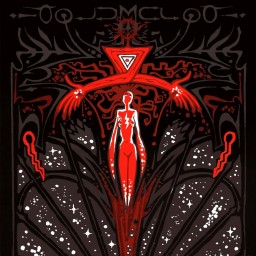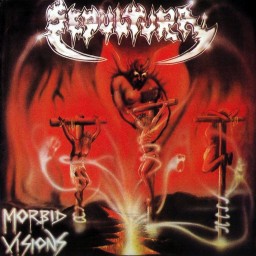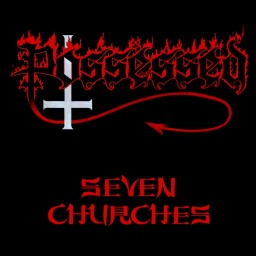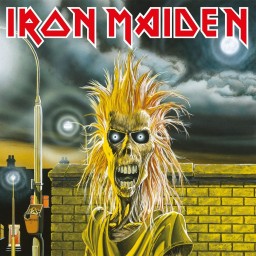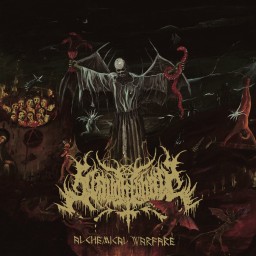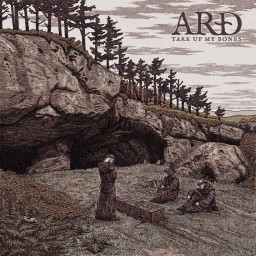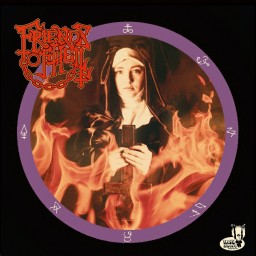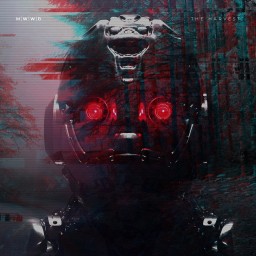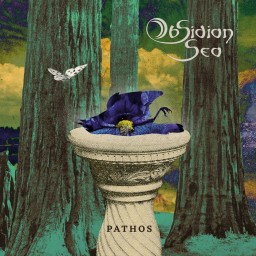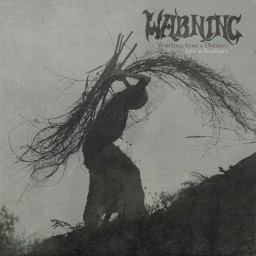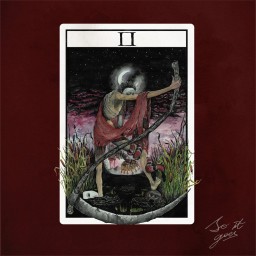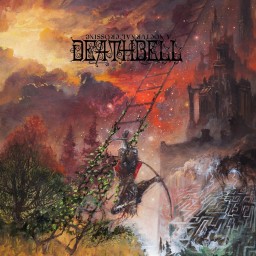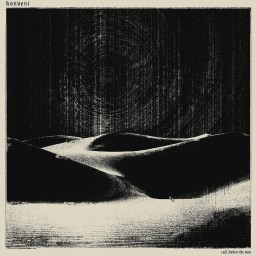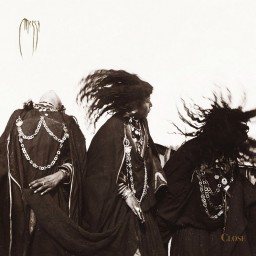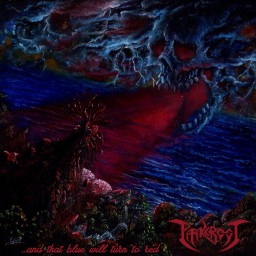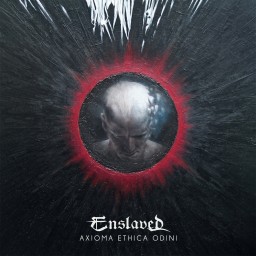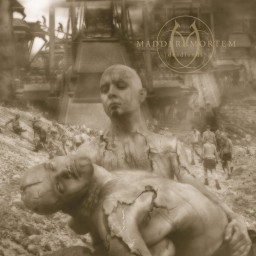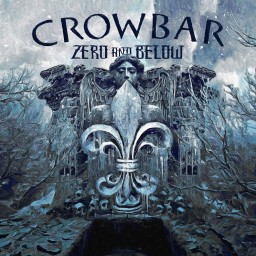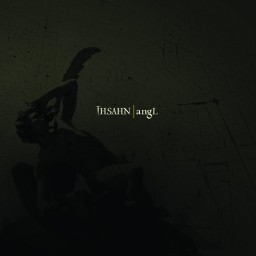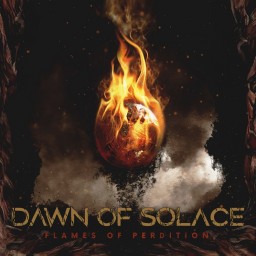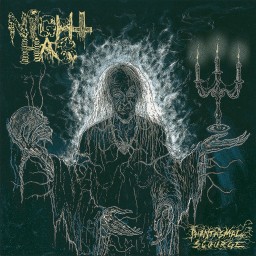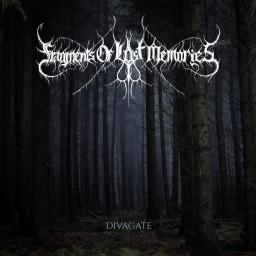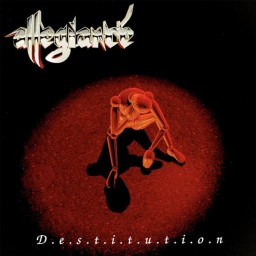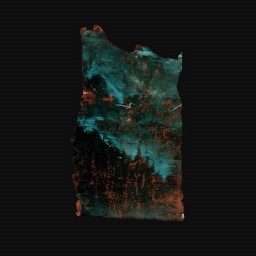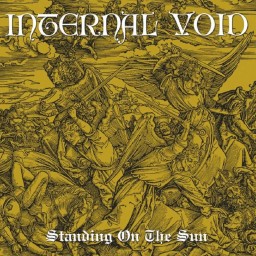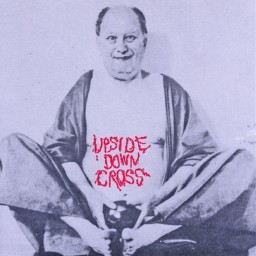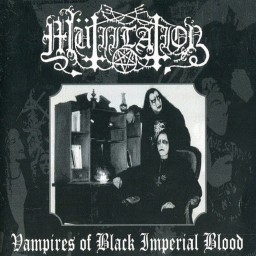Sonny's Reviews
At last us Brits finally get involved in the development of death metal, showing those Yanks that England's Midlands isn't yet a spent force in the world of metal and you don't need Floridian sunshine to play death metal when you've got the rain-drenched, overcast skies of Coventry hanging over you! The Midlands already had an extreme metal scene with Birmingham's legendary grindcore outfit Napalm Death hailing from only a few miles distant from Bolt Thrower's native Coventry. Now Bolt Thrower have always been one of my favourite death metal bands and are one of the few I actually enjoyed at the time, having first encountered them on legenday UK DJ John Peel's evening show performing one of their numerous sessions (probably around the time of the debut's release) so this isn't my first real encounter with In Battle There Is No Law!
The d-beat influences from fellow Midlanders Discharge as well as the grindcore of Napalm Death are plenty evident on Bolt Thrower's debut album. The production is very crust-punk with a lo-fi, echoey and muddy sound that would actually become quite a big part of early death metal (and particularly death doom - see my comments on Sempiternal Deathreign's demo). The black and white pen-drawn cover is another nod to their crust punk roots and influences. They play ridiculously quickly and very loosely, almost verging on sloppily, very much as a result of the Discharge / Napalm Death influence on their early work and their sound is built on a massive bottom end. Their lyrical obsession with war and it's effects are evident even this early on with tracks like the title track, Attack in the Aftermath and Nuclear Annihilation describing the numbing effects of war on the human psyche.
In Battle There Is No Law! is a raw and visceral slab of UK metal history that illustrates the development of a different branch of the death metal tree as a result of influences that are separate from the US experience of early death metal and show that DM did not spring from a singular influence, but is rather a product of different influences from a diverse set of locations. Personally I love this kind of shit, but it IS quite different from the likes of Death and Morbid Angel and sounds much more DIY with a demo-ey feel to it that may not appeal to everyone.
Genres: Death Metal
Format: Album
Year: 1988
For the longest time it seemed like thrash metal was dead. For most of the nineties and 2000s it lay on a cold slab, nothing more than a lifeless husk. It's former heroes had either sold out, lost the magic touch or just plain old given up. Then, as the second decade of the 21st century approached, a small group of bands from Chile, like a South American Dr. Frankenstein, began to breathe new life into it's inert corpse. Bands like Force of Darkness and Hades Archer combined black metal with thrash, which was not a new concept, but the Chileans made it their own by sheer force of personality. These were then followed by bands like Demoniac, Critical Defiance and the subject of this review, Ripper. These bands took the more aggressive thrash of Slayer and Kreator and took it in a bit more of a technical direction to produce some truly brilliant albums of insane thrashing madness.
Raising the Corpse is a maelstrom of high velocity thrash riffing, demonic drumming and evil, rasping vocals that is as thrilling in reality as it sounds on paper. It isn't a million miles away from the mid-eighties deaththrash of an album like Seven Churches, albeit with better production. Speaking of the production, the one point that lets the album down is that the solos sound buried and shoved down in the mix when compared to the rhythm guitar and are even threatened by the bass at times which is very prominent, as seems fairly common in modern Chilean thrash metal. That is a fairly minor annoyance though and doesn't kill the album because the songs are pretty damn good, the playing is technically superb and it has energy and adrenaline to spare, so for a modern thrash album there isn't really much more you could ask for is there?
Genres: Thrash Metal
Format: Album
Year: 2014
I have always been a big adherent of the pagan/witchy psych/stoner female-fronted doom scene to which Alunah are a major contributor, but even I am getting a little bit weary of the same old tropes being trotted out and lazily passed off as new material. It is coming up to a decade now since the best material in this genre was released, Windhand's Soma, Blood Ceremony's The Eldritch Dark and Alunah's own White Hoarhound all being prime examples and all approaching ten years old.
Strange Machine very much sounds like a band "dialling it in" and very few tracks remain in the memory for long after the album is finished. Sure, it is technically pretty good, but it is just lacking in any bite whatsoever and worst of all, it just isn't heavy enough. This is why I rave so much about bands like Messa and Subrosa, bands who are doing something else with the female-fronted doom sound rather than just trotting out the same old cliches which have been done to death.
Genres: Stoner Metal
Format: Album
Year: 2022
Firebreather are a Gothenburg stoner three-piece and Dwell in the Fog is their third full-length since forming in 2016. They play a heavy stoner metal with plenty of doom influence and an extra layer of heaviness added by incorporating a bit of Mastodon-like sludge, the most obvious comparison being High on Fire. It's not especially original but it is well done and undoubtedly it is heavy as fuck. It's six tracks all hover around the six minute mark with the album clocking in at just under forty minutes - a perfect length for an album of this type I would suggest. If you are a fan of well made, ultra-heavy stoner music looking for a new jam then Firebreather may well tick all your boxes.
Genres: Stoner Metal
Format: Album
Year: 2022
Dead Witches have faced a lineup upheavel since their debut, Ouija, was released in 2017, with the sad passing of guitarist Gary Elk and the departure of vocalist Virginia Monti. However, the bedrock of the band, bassist Carl Geary and legendary ex-Electric Wizard drummer Mark Greening, are still very much in residence and with the addition of Oliver Hill's mighty riffs and Soozi Chameleone's vocal charms, nothing much has changed. I would say this is a marginally better record, sounding a lot tighter and more titanic than it's predecessor and feels like a band moving onwards and upwards. Sure there is a case for bemoaning the fact that nothing much has changed and it still churns out the female-fronted occult doom tropes, but it is done exceptionally well and if this is your bag, then it will hit the mark for sure.
Genres: Doom Metal Stoner Metal
Format: Album
Year: 2019
The Ocean is Texans Fostermother's second full-length and my first exposure to the band. The trio play a stonerised doom metal that has become exceedingly familiar over recent times, to such an extent that I was initially underwhelmed by The Ocean, at least until I got to the title track that is, which was the point where my ears picked up and I thought that maybe here was something worth more attention here. There isn't anything here you haven't heard before, but there are some decent doom riffs with a nice beefy tone to the guitar sound, the rhythm section is pretty solid with a fairly pronounced bass presence. Guitarist Travis Weatherred handles vocals and they are fairly functional, sounding not unlike Ghost's Tobias Forge. All in all a solid slab of stoner doom that is back-loaded with the stronger material in the second half, The Ocean and Redeemer being the pick of the tracks for my money.
Genres: Doom Metal
Format: Album
Year: 2022
Mares of Thrace are a Canadian sludge / post-hardcore duo and The Exile is their third album and the first for almost a decade. The mainstay of the band is vocalist / guitarist Thérèse Lanz who has latterly been joined by drummer and bassist, Casey Rogers (who also produced The Exile), since original drummer Stefani MacKichan departed some time ago. I quite enjoyed The Pilgrimage, although it's been a while since I listened to it, so I was reasonably interested when I saw MoT had a new album coming out. Well now it's here I've got to say I'm impressed and I think it is actually better than The Pilgrimage, mainly due to the fact that it is more doomy than the former release with less focus on the post-hardcore element and as such would always appeal more to an old doomhead like me. Rogers, as producer, obviously knows what he is about because the production is way more suited to a doom-driven album with a thicker, heavier sound than previously. Thérèse's vocals still sound as aggressive as they did previously, the intervening decade not curtailing her vocal savagery one iota. The songwriting seems to have matured somewhat this time around, the songs sounding more complex and the playing more technical, sometimes briefly flirting with atmospheric sludge, all without compromising the band's innate aggression. Overall, something a little different to the usual doom / sludge template and a nice progression from the band.
Genres: Sludge Metal
Format: Album
Year: 2022
Thorns were formed in 1989 as Stigma Diabolicum, changing their name to Thorns in 1990 and are the brainchild of Snorre W. Ruch who, as any black metal historian knows, was the man sentenced to eight years in prison in 1994 for being an accomplice in the murder of Euronymous by Burzum's Varg Vikernes (although Vikernes has since said Ruch was merely in the wrong place at the wrong time). This enforced hiatus meant that despite releasing a couple of well-received demos in '91/'92 Thorns didn't release their debut and sole (up to time of writing) album until 2001. According to well-known metal historian Fenriz, Ruch actually invented the black metal riffing technique and was the guy who taught it to Euronymous, so certainly his black metal credentials are impeccable. Apart from Ruch, the album features Mayhem's Hellhammer on drums and vocal duties were shared between Dødheimsgard's Aldrahn and Satyricon's Satyr. The album musically is an unholy alliance between quite brilliant early second-wave black metal menace and machine-like industrial influences. Now I have never tried to hide my love of nineties black metal, but I find industrial metal to be hit and miss, too often sounding contrived and even corny on occasion. Luckily Thorns seem as adept with their industrial rhythms and effects as they do with their black metal blasting and manage to marry the two with unrivalled skill and as a result produce one of the all-time great industrial black metal albums and my personal favourite in the style.
Thorns' agenda is set from the off with opening track Existence kicking off like a straight-up BM track, very much like Emperor's earlier stuff actually, but after about thirty seconds or so the track stops abruptly and someone exclaims "Jesus... what a mindjob!" The track then kicks back in, but significantly changed with a weird, theremin-like effect added and a much more machine-like aesthetic, particular in the percussive department, as if they are saying "we CAN do that, but instead we're gonna do this". They also like to intersperse their black industrial core with some dissonance to further prevent the listener from getting too comfortable and to keep them on their toes. One such track is the second, World Playground Deceit, which is initially quite dissonant, but then right in the middlle of the track they plant a thrash metal riff and you just start to get your head nodding when the angular and dissonant nature of the track suddenly returns and you are left hanging (but in a good way!) Shifting Channels is a track where the band seem to go all-in on the industrial side and is extremely machine-like in both percussion and riffing with a slower tempo and disturbing, almost crooning vocal that sounds like a serial killer talking to himself. The second half of the album opens with a brace of connected tracks, Underneath the Universe parts 1&2 which bring something quite different. Part 1 is mostly a dark ambient piece, that features some excellent martial drumming earlier on before giving way to a fairly reflective cosmic ambience that provides a stillness at the heart of the album in contrast to the industrialised cacophony going on elsewhere. Part 2 sees the return of the martial drumming which is joined by an equally military-sounding riff as the vocals intone once more the inner workings of a disturbed mind.
All in all this is an exceedingly adept realisation of the industrialised black metal aesthetic, with neither component dominating the other, both working together in a synergy that lifts the music to a level few similar practitioners have ever come close to. I think it would probably appeal to fans of black metal more than it would your average Fear Factory or Ministry fan, but that is as much down to BM being a hard sell outside of it's adherents than any commentary on the quality shown here. If you are in the market for industrial black metal then you really have got to start with Thorns as most others are merely pale imitations.
Genres: Black Metal Industrial Metal
Format: Album
Year: 2001
Desolate Shrine are not a band I am at all familiar with, but instrumentalist L.L.'s other band, the death doom act Convocation I am very much acquainted with, last year's Ashes Coalesce being one of my favourites of 2021 and ultimately a vinyl purchase. L.L.'s Desolate Shrine are more of a death metal project than Convocation with only brief dalliances with death doom. Their sound is quite dense with a significant bottom end and a satisfying complexity that never strays into technical excess, but rather focusses more on interesting twists and turns within the songwriting. This feels to be more than just straight-up death metal, although I would hesitate to call it progressive, it does feel so occasionally with the incorporation and hints of other genres such as black metal, death doom and even, I venture to suggest, a bit of grind (during The Dying World).
Fires of the Dying World is also atmospherically accomplished with a darkly grim and forbidding face being presented to the listener which is occasionally leavened by short acoustic interjections. The albums longest track, the ten-minutes of The Silent God in particular, is an impressive exemplar of modern death metal songwriting and it's potential complexities. The subsequent track, Cast to Walk the Star of Sorrow, then attacks more brutally and with the synth backing of the track's first half even has hints of classic-era Emperor to add to the death metal pot.
I have seen a few comments that this doesn't do anything new and whilst that may strictly be true, it is far from a boring rehash of other, superior albums. I don't know sometimes what it takes to please people because this is extemely well-written, adeptly performed, fairly complex and brimming with atmosphere, so if that isn't good enough for you then I don't know what is! Consequently this will probably end up being one of those albums that is overlooked in favour of more hyped, inferior product which is a big shame because there is much to admire and enjoy here.
Oh and is it me, or is that Varg Vikernes on the album's cover being tormented by demons?
Genres: Death Metal
Format: Album
Year: 2022
Richmond's Antichrist Siege Machine unleash a withering hail of suppressing fire with this, their sophomore full-length that will have anyone caught in it's firing line running for cover. In other words, this is high-casualty war metal that should successfully satisfy fans of the genre. It does have higher production values than the classic releases of the nineties from the likes of Blasphemy and Beherit, so that muddy, fog-of-war sound is lost and the music has to deliver in the light of this sonic clarity. This, I think it manages successfully, still sounding filthy, but without descending into a total wall of noise. For me, a really good example of a genre that may have had it's heyday but can still deliver exciting and exhilharating metal when done right.
Genres: Black Metal
Format: Album
Year: 2021
I'm not the most ardent follower of Dissection, but they certainly deserve plenty of credit for pretty much inventing and perfecting the genre of melodic black metal with the release of this, their debut. Follow-up Storm of the Light's Bane is held up as the superior release but, to be honest there isn't a huge deal in it as this is a killer example of melodic black metal that has rarely been bettered. Now, melodic BM releases tend to get a bit of a rough ride from the more tr00 amongst black metal fans, yet Dissection seem to get a free pass, probably due to the position they hold in black metal history (and notoriety, to a degree).
Dissection didn't subscribe to the minimalistic or lo-fi approach of many of their contemporaries, with a crystal clear production job and a fairly muscular sound for early nineties BM. There are still remnants of the band's death metal beginnings to be found in their sound (check out the track Frozen) and that is the source of this beefier approach to black metal. The guitars sound fantastic with Jon Nödtveidt and classically-trained John Zwetsloot producing some sterling riffing and lead work, Zwetsloot also adding classical guitar on the short interlude pieces. Vocally Nödtveidt had one of the finest voices in black metal, I really love the harsh rasp to his delivery that is neither too shrill nor too deep. There are some great tracks here, albeit the best are front-loaded with Black Horizons, A Land Forlorn and the title track all featured early in the album. Still, if you want to hear the original and, debatably still the best, melodic BM then you really have to check out both The Somberlain and Storm of the Light's Bane.
Genres: Black Metal
Format: Album
Year: 1993
This was recorded in 1986 but was shelved by the band as they faced some lineup issues and were unhappy with the sound of the album. It was heavily bootlegged but eventually was cleaned up and given an official release by Earache in 1991 and this is the version I have been listening to. It's got to be said that this seems to raise the bar as far as metal extremity went in 1986 and you can't help but wonder if the argument about the first death metal album would have been well and truly been settled if it was put out at the time of recording. The riffs here sound like something beyond the ultra-aggressive thrash metal that was being produced by the most extreme bands at this time and more like a whole new thing entirely, Trey Azagthoth proving that from the very get-go he was ahead of the curve when it came to writing death metal riffs. In fact the riffing and the solos are the major draw for me here, their sheer brilliance somewhat overshadowing the other aspects of the album. Lyrically Morbid Angel looked to the Necronomicon for inspiration and consequently the lyrics are very much occult-centric. As many other commentators have pointed out, the weak point is drummer / vocalist Mike Browning and his performance behind both kit and mic may well be the reason that Abominations of Desolation was shelved (and his leaving the band, although an altercation with Trey over a girl is also cited as the reason for the latter).
To choose to shelve the album was a brave move really when you think about it, after having put the effort into producing a debut record, then holding off until they considered themselves better placed to produce a worthwhile release must have taken a great deal of discipline. Rather than just wanting to see their name on a record sleeve they took the conscious decision to wait and that must be applauded as it shows a band willing to go the extra mile to get across their true vision rather than settling for less. Most of the tracks here (all except for Demon Seed I believe) have been reworked and released on later albums, proving that they never felt the material itself was weak, but rather it didn't come across as they had envisioned in this form. On the whole, I would say this is not merely a release of historical importance in the emergent death metal scene of the 1980s, but is a decent release in it's own right and the perceived weaknesses aren't complete deal breakers for me, as the material and guitar work is still strong enough to give the recording value.
Genres: Death Metal
Format: Album
Year: 1991
Marduk, along with Emperor and Burzum, were one of the bands who got me into black metal around the turn of the millenium and their Panzer Division Marduk is still one of my favourite black metal albums. They are a band who, unfortunately though, seem to let themselves down with some lacklustre stuff, especially in more recent years, but when they get it right they can be as good as anyone and 2004's Plague Angel stands as testament to that.
The album is not exactly a retread of PDM, but it does, inevitably, cover some of the same ground as illustrated by the blistering opening one-two of The Hangman of Prague and Throne of Rats which are tracks that would be very much at home on Panzer Division Marduk, their relentless artillery barrage approach fitting right in with that albums aesthetic. However, on Seven Angels, Seven Trumpets things get very different with a much slower tempo and an almost doom metal main riff accompanying new vocalist Mortuus' imperious vocal savagery, as he invokes the coming apocalypse. After another couple of rippers, Perish in Flames provides another example of slower, more doom-drenched material. This doomy atmospheric works really well within the context of the unholy brutality of many of the other tracks on offer on Plague Angel and whilst providing some relief from the relentles sonic onslaught, they provide no remission from the violence and inevitability of death. However, instead of signifying sudden death from bullet or bomb of the quicker material, they seem to invoke a more creeping, insidious end at the hand of disease and plague. Deathmarch provides a further descent into despair with it's satanic-sounding horns and choir, not so much an interlude as a vision of hell. The mental images that are summoned by Plague Angel are reinforced by an imagined odour, like an unbearably thick, ferric stench of spilled blood and rancid meat, mixed with the smell of cordite and concrete dust. This isn't an album for the optimistic as it plays on all the horrors and terrors of human existence with not a single sign of hope or light.
Marduk have rarely sounded better than on Plague Angel, whether it is the swirling maelstrom of Morgan Håkansson's riffing or Emil Dragutinović's drum's relentless blasting, the four members are all in perfect sync and provided the proof that was sorely needed at this point that they still had what it takes and that they could put out an album worthy of attention in the rapidly expanding world of black metal. Man, another Plague Angel is long overdue from these guys now!
Genres: Black Metal
Format: Album
Year: 2004
Idolum is an absolutely sublime mixture of sludge metal and space rock, with a psychedelic edge that gives it an almost meditative quality. First and foremost, however, it is ridiculously heavy with an almost impenetrable wall of sound that rolls over you like a landslide. The guitar tone is extremely thick and, when combined with the heaving bass it has so much bottom end that it may well shake your teeth fillings loose. The vocals are distant-sounding and to some extent irrelevant as no one really listens to an album this tangibly heavy for poetry or philosophical insight, the vocals merely add mortar to the immense wall of sound assaulting the listener's ears. There's a lineage to this album that stretches back to Space Ritual-era Hawkwind and early Pink Floyd, but it has been fed through the gravitational field of a black hole to emerge as something transformed. I don't know if music this crushingly heavy should conversely be so relaxing, but there is something about it that is mantra-like and calming and that isn't just the drone-like extended final track, Void/Elephantom, but the heavier stuff too. If you like Electric Wizard but think they are a bit lightweight then give Idolum a try!
Genres: Sludge Metal
Format: Album
Year: 2008
The version of Morbid Visions I have been listening to also has the Bestial Devastation tracks from the 1985 split with Overdose so I thought I would kill two birds with one stone and cover both here. As much as I am a huge fan of the four albums from Schizophrenia onwards, I have never even listened to these earlier releases before now... and wow, what a treat they are! It is amazing to think that the Cavalera brothers were mere teenagers at the time, but the fearlessness of youth, I suspect, enabled them to produce a brace of releases that pushed the envelope of what was then considered extreme in the metal world.
First off, Max has got the best iteration of the death growl heard up to this point, being deeper and gruffer than most of the other frontmen of the time who's vocals still remained very much in the Tom Araya / Mille Petrozza barking style. The playing is a bit messy and some of the transitions aren't as smooth as people would like, but hell, they were still learning their craft and yet mananged to produce a fireball of furious riffing and incendiary soloing that gives a real insight into just how fucking awesome and ahead of the curve early Sepultura were. I am not a person who is impressed by flashy showmanship or technical wizardry (in fact, quite the opposite) so I may be better disposed to such an obviously flawed release as Morbid Visions because, for me, it succeeds by sheer force of will and energy in presenting something that is just so damn exciting I can't help but love it. This is heartfelt metal from a band of youngsters in it solely for the love of metal at this point and that ethos shines through really brightly on this debut album. It seems strange that this is never mentioned much in the conversation about early death metal releases because there seems to be plenty here that qualifies - Mayhem and War both sound very death metal to me and as a whole I would venture it is more death metal adjacent than Possessed's Seven Churches is. The production isn't great, the drums seem to be pushed too far to the fore, sometimes at the expense of the guitar and there isn't much by way of bottom end but, for me, this is only a minor issue and certainly isn't a deal breaker as far as future listening potential goes.
Bestial Devastations consists of an intro and four tracks, again the production leaves a lot to be desired (sounding a bit like Seven Churches production-wise) and the performance could be tighter, but all the tracks have great riffs and an infectious energy that true metal heads should find difficult to ignore. Both the split and debut full-length marked Sepultura out as a band who would most likely go places and were pretty extreme-sounding for 1986 and are deserving of being part of the conversation surrounding the development of death metal in the 1980s.
Genres: Death Metal Thrash Metal
Format: Album
Year: 1986
I wish I could say that I have been a fan of Seven Churches since it first came out, that it changed my metal world and set me on my path to extreme metal appreciation, but unfortunately I was never so cool that I got into underground metal as soon as it was released, especially as, at the time, I lived in the arse-end of nowhere in England's industrial north west where the metal underground was on another planet entirely and the metal community I was part of numbered only one - me. Anyway, despite coming to it late, it was still instantly obvious, even to me, that, given the date of release, this is one hell of an influential album in the evolution of death metal.
Possessed were born out of the rarified atmosphere of the early eighties Bay Area thrash scene and although their sound would indicate that they were heavily influenced by Slayer, they themselves always cited Exodus and Venom as their main influences (quite plausibly I suppose, if you think about it). They released a demo in 1984 featuring three tracks which would eventually turn up on Seven Churches, Evil Warriors, Burning in Hell and of course, Death Metal. After playing a few shows with them, Exodus got Metal Blade interested and the track Swing of the Axe (featured on their second demo and a blistering track in it's own right that sadly doesn't appear on Seven Churches) was featured as the opener on the compilation Metal Massacre VI. This track got the attention of Combat Records and Possessed were offered a deal, releasing their debut full-length in 1985. The rest, as they say, is history. Now, is this the first death metal album? Personally I don't think so as it still retains a huge amount of thrash metal DNA, but Possessed had definitely pushed thrash to it's limit and had introduced elements that would be expounded upon later by true death metal outfits like Death and Morbid Angel.
So to the album itself and after the Tubular Bells intro, The Exorcist bursts from the speakers like a wild animal, tearing through your eardrums with an aggression and savagery that had been unthought of at this point in '85. Sure Slayer were plenty aggressive, but this opening salvo from the new boys was on a whole new level and it becomes apparent very early on that there is to be no respite from this blitzkrieg until the last notes have played out. The production first off isn't anything like as clear as the majority of metal albums you would hear in 1985, it's slight echoey sound possibly being the first iteration of that quintessential cavernous sound that became so requisite of old-school death metal. The riffs are tore through at breakneck pacing and are ridiculously heavy, the soloing is straight out of the Jeff Hannemann school of blistering, psychotic-sounding and squealing guitar torturing. Jeff Becerra's vocals and satanic / demonic lyrics went even further into the extreme than Tom Araya, his half scream / half growl paving the way for more and more vocal extremity in metal as subsequent singers tried to sound even more "evil" than the Possessed frontman. The drums are more in keeping with the thrash metal zeitgeist, not really possessing the blastbeat-heavy pummelling of true death metal drumming and are one of the main reasons why I still consider this mainly a thrash album. But of course there's that final track and, much like Venom with Black Metal, the band are at least assured a mention in the death metal conversation having coined the genre name. Every track here is killer and still sound great now, closing in on forty (count 'em) years later. This album has every right to be mentioned alongside thrash greats like Reign in Blood and Master of Puppets for it's sheer aggression and an almost tangible evilness and whether it is death or thrash metal is moot because either way it is a classic metal album in it's own right.
Sadly, Possessed never approached this level of awesome again in my opinion, but does that really matter because what they produced here was a catalyst and a precursor to one of the most prolific extreme music genres in history and most definitely secured them a legacy and immortality beyond the vinyl grooves of a mere record into the collective folklore of metal - listen to early Morbid Angel and Possessed's influence is plain for all to hear.
Genres: Death Metal Thrash Metal
Format: Album
Year: 1985
Early 1980 I had just turned 18 and was mad into metal and heavy rock: Motörhead, Black Sabbath, Judas Priest, Thin Lizzy, UFO and Budgie to name but a few. The trouble was, these bands were great, but they were old guys - some were even in their thirties! Kids my age were all playing in punk rock bands and, I had to admit, those punks sure played with some fire and energy. Then the music press started buzzing about this young bunch of cockney upstarts playing heavy metal called Iron Maiden and my ears pricked up in interest. Meanwhile, I picked up a copy of the newly released Metal for Muthas and it was pretty obvious to everyone that Maiden were the stand out act on that compilation (although Angel Witch's Baphomet is fucking brilliant too) and their two tracks, Wrathchild and Sanctuary, were snarly and aggressive calls to arms. Then came the single Running Free which was a bit different to the tracks on MfM and had a bounce to it that made headbanging a cinch!
Anyway, fast forward to spring and Maiden's self-titled debut hit our local Woolies and off I go to procure a copy. The first thing that confronted the prospective purchaser of said wax disc was the intense stare, rictus snarl and punk haircut of "Eddie the 'Ed" daring us to buy this album or be a pussy and stick with KISS or Foreigner! Needless to say, I was all in and handed over my quid seventy-five or whatever it was back then and headed off home with no shortage of anticipation to hear exactly what Chris Welch and Malcolm Dome were making all that fuss about in the music weeklies.
So, needle hits vinyl and
Next up and closing side one is one of the album's real highlights, Phantom of the Opera. Which already showed that Maiden had a bit more in their songwriting arsenal than the vast majority of bands sheltering under the NWOBHM umbrella, with Steve Harris in particular wanting to pursue a more epic and complex route than was the lot for most metal bands of the time and although Phantom is no Rime of the Ancient Mariner or even Hallowed Be Thy Name it is still a brilliant piece of nascent progressive heavy metal that doesn't trade complexity for heaviness, but keeps both intact and serves as one indicator as to why Maiden succeeded where so many others failed.
The instrumental Transylvania opens side two and allows the guitarists to showcase their skills with more of their soon-to-become trademark incendiary soloing, Harris' bass throbbing along underneath and Clive Burr setting the tempo with his fantastic, on-the-mark drumming skills. Transylvania subsides into the gentle intro to another somewhat atypical NWOBHM track, Strange World, where we actually get a kind of vulnerable, touchy-feely lyric and atmosphere that most metal acts would never even contemplate at that time. At this point Maiden ramp up the pace and aggression once more and are introduced to one of Harris' enduring lyrical characters, Charlotte the Harlot of 22 Acacia Avenue fame. Although the middle section and it's attempt at pathos is a little bit of a misstep for me, the track is otherwise heavy metal heaven. Rounding off pretty much as we started with a snotty-sounding, snarling piece of metal ass-kickery Iron Maiden firmly plant their flag in the ground.
Obviously the band later went on to dominate the world of metal, at least for a while after Di'Anno was replaced by Bruce, but I think it is testament to Di'Anno's performances and vocal style that the two albums he performed on are still massive fan favourites and, in truth, I have never heard tracks from the first two albums performed better by Bruce than they were by Paul, although, to be fair, he may well have conversely struggled with tracks that Bruce featured on. So, while Iron Maiden at the point of their first album were still on a journey rather than having arrived at a destination, there can surely be no arguing that it was a trip well worth any fan tagging along on. To call the album the birth of a heavy metal legend is no hyperbole and is a defining moment in metal history.
Genres: Heavy Metal
Format: Album
Year: 1980
Slaughtbbath are a three-piece blackened thrash outfit from Chile. They started out as a straight up, balls-out black metal band playing supercharged black metal with relentless fury, but for their 2019 album Alchemical Warfare (only their second full-length release, despite a plethora of splits and eps), they took a huge fistful of the thrash of the teutonic giants Kreator and Sodom and chucked it into the melting pot along with the furious black metal of their previous releases. They fire off riffs like rockets on Bonfire Night (or July 4th if you insist) lighting up the sky with fire and fury, tearing through track after track in an almost manic assault on the listener's eardrums. Their blackened thrash leaves little room for wanky showmanship, consequently there isn't as much focus on solos as a lot of thrashers may want and most of the solos are of the short, sharp shock variety as favoured by Slayer, but that is a small price to pay for such outright aggression and savagery. The only respite from the ceaseless onslaught is held within Rejoined Into Chaos when the band do slow it down a little, although they can't manage to restrain themselves for the whole track and unleash the most extravagant soloing of the album towards it's final fadeout.
Track titles like Ritual Bloodbath, Prophetic Crucifixion and Amulets of Carnage should leave you in no doubt as to where these guys are coming from. This is no touchy-feely metal as is becoming en vogue in some metal circles, this is pure unadulterated violence and horror, making no excuses and issuing no apologies for it. In other words, the foundation that thrash metal was built on and too many metal bands have forgotten about.
Genres: Black Metal Thrash Metal
Format: Album
Year: 2019
Arð is a solo project of Mark Deeks who, since 2016, has been the keyboard player for UK pagan black metallers Winterfylleth. Arð play a medieval-based, folk-influenced kind of doom metal that is, on the surface, a very different beast from Winterfylleth, yet if you are familiar with the Mancunians you will know that they are heavily involved with folk music, whether through their Harrowing of Heirdom album or Dan Capp's Wolcensmen project and the track The Green Cathedral on their The Dark Hereafter album is very much in the vein of the music on Take Up My Bones, albeit with blackened vocals.
I've got to say, despite initial reservations about an album tagged as doom and folk metal (no folk metal here), this has quite grabbed my imagination and is a very pleasant departure from a lot of the doom metal I usually listen to. Take Up My Bones' doom metal is very reminiscent of the kind of melancholic style often employed by any number of gothic doom outfits eager to follow in the footsteps of My Dying Bride et al, with contemplative piano, synths and strings woven into the fabric of the tracks, yet also containing the sweeping, soaring majesty found in some of the best atmospheric black metal from the likes of Saor, albeit within a doom metal context. The medieval folk elements are incorporated superbly well and sound sincere, thus avoiding the cheesiness so often (rightly) associated with any kind of folk metal. This is not the kind of medieval folk we would associate with The Lord of the Rings or fantasy scenarios generally, but a choral style of folk that has it's roots in ecclesiastical music.
The concept of the album is something to do with the relics of the bones of Saint Cuthbert, who was associated with Lindisfarne monastery and is the patron saint of Northumbria in the north-east of England where Mark Deeks makes his home. His remains were thought to be responsible for several miracles in medieval England and he was a big inspiration to King Alfred the Great in his battle against the Danes of ninth century England. The religious theme is realised by rich-sounding and nicely performed choral vocals that are very impressively produced and add to the overarching majesty of the music on offer. This is a very atmospheric album, weaving strands of melancholy and hope together into a gorgeous tapestry of sound. Arð aren't trying to squeeze the breath out of your body with huge, crushing riffs, but are rather trying to fill your soul with renewed hope.
As much as I love orthodox doom metal, it is nice to hear someone try something that is a little bit different and to eschew regurgitating the same old ideas. Take Up My Bones isn't a perfect album by any means, some of the tracks become a little samey and there is some limitation to how far a solo project and studio-generated effects can go, but I genuinely applaud Arð's attempt to produce something fresh in the doom scene and as long as artists like Arð can still serve up something of a surprise then doom metal is far from a spent force.
Genres: Doom Metal Folk Metal
Format: Album
Year: 2022
Fantastic! My old friend Sami Hynninen (aka Albert Witchfinder) is back with a new doom metal band, presumably named after Witchfinder General's second full-length. We've not heard much from the Reverend Bizarre legend since he left Spiritus Mortis in 2017, so when this came out of the blue I was exceedingly excited to have some new material at last. The reason I'm so fond of Witchfinder is that he truly "gets" doom metal and with his new band he seems to be mining the traditional doom scene of the eighties and early nineties with more than a few nods back to classic Black Sabbath. It seems to be no coincidence that the band are named after a Witchfinder General album. The new band is a four-piece which, as well as Witchfinder, features fellow Finn, former Impaled Nazarene and Sentenced bassist Taneli Jarva along with Cypriot tattoo artist and ex-Electric Wizard bassist Tasos Danazoglou on drums and completing the lineup is Greek guitarist Jondix.
The songs on Friends of Hell are fairly short and relatively punchy for doom metal, but this was not uncommon on early trad doom albums and is in sharp contrast to Witchfinder's material with Reverend Bizarre. Lyrically and thematically we are in B-movie, schlock-horror territory with song titles like Shadow of the Impaler and Into My Coffin, which again is very much par for the course with a lot of trad doom albums. The distorted riffs are pretty damn good, hardly original, but entertaining as hell with a really nice depth to the guitar sound. Albert Witchfinder has some limitations as a vocalist, but I actually think his voice really suits the material, as it did with Reverend Bizarre - not everyone needs to be a Messiah or Rob Lowe. The rhythm section isn't bad, although they don't shine through the mix as much as they could, this is only a minor niggle and is not a huge distraction.
All in all, if you are in the market for some new straight-up trad doom with a cheesy occult theme then you would be hard-pressed to find a better example than Friends of Hell.
Genres: Doom Metal
Format: Album
Year: 2022
MWWB (having abbreviated their name from the mouthful it was previously) return with an even more atmospheric album than 2019's Yn ol i annwn. Alternating between dreamily-voiced, atmospheric doom metal and futuristic synthwave tracks it feels like a sci-fi concept album. The doom tracks are understated, but no less effective for it, relying on building an atmosphere rather than crushing the air out of the listener with massive riffs, Jessica Ball's ethereal vocals soaring over the instrumentation like a siren call. Don't get the wrong impression, this is still most definitely doom metal, I merely want to state that laying everything to waste with mournful sonic heaviness isn't the music's sole intention. The Blade Runner-like synth-driven interludes are a nice touch and help give the album a definite identity and aid it in poking it's head above the crowded field of female-voiced doom metal. A nicely interesting release that gives doom metal fans something a little bit different to digest.
Genres: Doom Metal
Format: Album
Year: 2022
What an absolute killer intro to opening track, Lament the Death of Wonder, a track that combines doom metal with stoner and progressive rock for a roller coaster ride of a song. This momentum is dissipated a bit by ensuing track The Long Drowning that takes a little while to get into it's stride, although it does have a nice solo towards the end. The album as a whole has a greater stoner/psych/prog influence than their earlier material and there isn't anything inherently wrong with that, but it feels a little inconsistent at times. It's the heavier tracks like the aforementioned opener and Mythos that initially appealed to me most, but there is just so much variety to their doom/stoner template so it never feels like they are retreading the same path on every track and the more I explore the album the more I discover. The production is very good and has a nice clarity and performance-wise the trio are spot-on. Just occasionally I feel that the band resort to a bit of noodling for noodling's sake where I would rather them just get on with laying down another killer riff. The last couple of tracks really up the prog ante and are where things get really interesting, suggesting a possible new direction for the band which may make their next release very interesting indeed. Obsidian Sea are definitely a band who are spreading their wings with this latest release and more power to them.
Genres: Doom Metal
Format: Album
Year: 2022
The original Watching From A Distance is my all-time favourite album, metal or otherwise, and resonates with me on a level unmatched by any other release. This is a live rendition of the entire album performed at 2017's Roadburn Festival and is a faithful reproduction of that album with former bassist Wayne Taylor backing up Patrick Walker as second guitarist. The live interaction of both band and crowd is minimal which would get some people asking "What's the point, then?" The point is that this is an album with an unequalled level of emotional outpouring and intensity which the live setting has possibly rendered even more poignant as Patrick Walker pours his heart out. The fact that Walker's vocals are obviously a one take, one-shot deal he seems to wring even more heartbreaking intensity from them, as if the guy is actually reliving the tales he is telling us there and then. I would love to be able to say I was there and have the memory of that performance etched into my memory forever, but I wasn't and so this is the next best thing as I still get to embrace this wonderful performance of a seminal album.
Genres: Doom Metal
Format: Live
Year: 2021
For the longest time I believed that thrash metal held no more surprises for me. That, however, was before I had heard Demoniac's incredible 2020 sophomore release, So It Goes. Sure, I have been very impressed by the vitality of the contemporary South American thrash scene, but the albums I had heard to this point were in the main existing tropes, taken and sharpened to the point of lethality. Some excellent stuff that had rekindled my interest in new thrash metal material, but Demoniac have gone well beyond that and So It Goes is a complete revelation to my jaded sensibilities. They play intense thrash metal with blackened vocals and hints at progressive tendencies and with a technical proficiency that is exceedingly impressive. The opening couple of tracks illustrate that these guys can out-thrash the shit out of almost anyone currently playing thrash metal. Fast, vibrant riffing, snarling vocals and a rhythm section that will destroy your apartment block if they play within a mile of it, deliver everything you could ever want from a thrash metal album. Then, following the opening one-two salvo, Extraviado opens up with a.. jazz clarinet. This is a weird and wonderful kind of doom and jazz number that may well leave you scratching your head, but I personally think is a glorious curveball that lets you regain some composure before the next neck-mangler. Equilibrio fatal is another riff-fest of lightning-powered thrash that will remove the skin from any unprotected body parts as it hurtles from riff to riff and contains some terrific soloing and superb basswork from Vicente Pereira.
This then brings us to the second half of the album, which consists solely of the almost twenty-minute suite of the title track which is a thrash metal tour de force and the track where Demoniac really show their chops and leave the competition eating their dust. Riff follows riff, solos rise and fall, that awesome, crunchy bass keeps baring it's teeth, Javier Ortiz snarls and sneers his way through the lyrics and our old friend that crazy clarinet even makes a reappearance. This track is one of the most glorious, OTT celebrations of thrash metal you are ever likely to hear and with the searing power of the shorter tracks from side one makes for one of the greatest thrash albums I have ever heard. Believe me, if this was released in the late eighties this would still be held up as an out and out classic. If, like me, you thought thrash metal was dead then spin So It Goes and behold thrash's Lazarus-like resurrection.
Genres: Thrash Metal
Format: Album
Year: 2020
I enjoyed French doom outfit Deathbell's debut album, 2018's With the Beyond, very much, it's female-voiced stoner vibe akin to Windhand and Alunah, bands I am a big fan of, so I have been anticipating a follow-up for some time now and at last here it is. Called A Nocturnal Crossing, the albums six tracks span a touch over forty minutes. It opens up with a great slab of uptempo stoner doom called The Stronghold and the Archer which gets the album off to a fantastic start and may well be my favourite track, it has a memorable melody and a strong central riff with some soaring keyboard work and singer Lauren Gaynor's vocals are strong enough to carry the song well. This is followed by Devoured on the Peak which is similar, but with more of a bluesy influence, a direction that Deathbell like to take fairly regularly with their doom and that will become even more pronounced later in the album. The single, The Ladder, at eight and a half minutes is the longest track here and is a bit more ambitious with more variation in pacing, some effective keyboard work and a nice guitar workout towards the end. The second half of the album continues in similar vein and closes with the title track, which is arguably the album's heaviest, it is another track with a blues influence and an extended guitar workout, although it does seem to end a bit abruptly.
There is an aspect to the band, I think the cumulative effect of the guitar work and the distant yet strong vocals that lend the tracks a kind of psychedelic-gothic edge but that doesn't detract from the stoner vibes either. There does seem to have been some progression since the debut with the band pushing at the boundaries of what they do, introducing a more progressive sound especially with a greater emphasis on the keyboards for example, without any serious wholesale changes to their overall sound, but coming at it with a freshness and ambition that makes it worthy of the four year wait. If you are a fan of female-fronted doom metal, such as the aforementioned Windhand and bands like Blood Ceremony then there should be plenty here for you to enjoy.
Genres: Doom Metal
Format: Album
Year: 2022
Konvent are an all-female four-piece formed in 2015 in Copenhagen, releasing their debut, Puritan Masochism in 2020. The debut comprised almost fifty minutes of sludgy death doom and was pretty solid, albeit lacking in variety. To be honest, this follow-up, Call Down the Sun, is very much in the same vein. The riffs have a Celtic Frost kind of vibe, being quite bombastic they invoke the atmosphere of a fading empire facing it's last days and are my favourite aspect of the album, the riff to Grains in particular is imperiously menacing-sounding. The vocals are alternately harsh sludgy barks and deep growls, the former being the most successfully employed, the latter I am not too sure about in all honesty, they lack the gruffness and abyssal depth of truly convincing death doom vocals. The tracks are quite samey and I sometimes found my attention wandering, which is never a good sign is it?
All in all Call Down the Sun is OK, but I couldn't really go any further than that. I would like to hear the band incorporate something a bit more diverse into their sound because, to be brutally honest, there are several others who do this sort of thing better.
Genres: Doom Metal
Format: Album
Year: 2022
I've been a fan of Italian doomsters Messa for some time now and I have been greatly anticipating the release of Close since it was announced towards the end of 2021. Well. now it's finally here did it merit all that anticipation? The answer has got to be a resounding yes from me. On Close Messa have taken what made Feast for Water the release it was and have expounded on it, yet they haven't lost touch with their roots in doom metal and, if truth be told, their doom sounds even heavier here than it did previously.
What sets Messa apart, however, is their willingness to incorporate other, often non-metal, styles into their doom material. Yes, other bands hybridise their doom with other genres like blues or gothic and black metal, but Messa incorporate even more diverse musical genres like dark jazz, middle-eastern music and even, dare I say, on the album's penultimate track, Leffotrak, grindcore! One of the reasons I like Italian metal so much is that Italian bands are never scared to try something different with what can be quite basic genres and progressive music seems to be very much part of the Italian rock and metal scenes and Messa fully embrace this quintessentially Italian ethos. Sometimes, however, it falls that some bands' ambitions outstrip their abilities to fully realise them, this is most definitely not an issue for Messa as they are consummately skilled in delivering their auditory vision. In Sara Bianchin they have arguably the finest female vocalist in doom metal (if not all metal), the power and quality of her singing leaves most other doom vocalists in the shade, if you need convincing listen no further than opening track Suspended and tell me I'm wrong!
The opener is one of the more straightforward doom metal tracks on offer, but it is so expertly paced and performed that it actually feels more complex than it is. It is here where it also becomes obvious that Messa haven't compromised their heaviness either for an increased diversity and complexity, as is further illustrated on Dark Horse which is a little bit bluesy initially, at least until it's Miserlou-like speedy breakdown around halfway through. This brings us to Orphalese that begins with a Middle-Eastern sound, reminiscent of some of the tracks from Hans Zimmer's Gladiator soundtrack, conjuring images of a Lebanese or Egyptian market scene, with Sara Bianchin's bluesy vocals soaring over it for a truly evocative and atmospheric track.
I don't intend to give a track-by-track rundown of the album, but if any album deserves one it's probably this. Whilst listening for the first time, I was genuinely excited to hear where each track would go as I had absolutely no idea, such is the variety of ideas on offer here. The performances throughout are excellent, whether it be Alberto Piccolo's guitar solos, Sara's vocals, the tightness of the rhythm section or the wind instrumentation of guest Giorgio Trombino and the production is crystal clear so that nothing gets in the way of the band's expression of their multifarous ideas. If there is any sense to the world then Close should propel Messa into the upper reaches of the metal universe and could well garner them exposure beyond metal circles. In truth I could spend all day heaping superlatives upon the band and this latest Meisterwerk, but why would you waste time listening to me when you could be listening to this instead?!
Genres: Doom Metal
Format: Album
Year: 2022
I know shamefully little about Chile other than it is very long, has a lot of mountains and is home to the world's driest desert, The Atacama, where there are many space observatories. The other thing I know is that the Chilean thrash scene is one of the more vital and vibrant iterations of the genre in these early decades of the 21st century. Bands like Demoniac, Critical Defiance and Ripper are but the tip of the Chilean iceberg and Parkcrest are another extremely talented bunch of thrashers. It does seem like quite a tight scene however, with Parkcrest guitarist Diego Armijo and drummer Nicolás Villanueva also playing in Ripper and vocalist/guitarist Javier Salgado playing in Critical Defiance and Hellish amongst several others. Formed in 2011, Parkcrest didn't release their first album until 2016's Hallucinative Minds hit the metaphorical Bandcamp shelves. Whilst being an energetic and raw album, Hallucinative Minds is far from the finished product, but did show some promise. So did the follow up, ...And That Blue Will Turn to Red deliver on that promise? Well, I would have to say that, by and large, yes it has and it is a massive leap forward when compared to the debut.
The first difference is that the production this time round is much improved from the debut and sounds powerful, yet has an impressive clarity that allows all the band member's contributions to distinctly be heard. The rhythm section of bassist Cristoffer Pinto and Villanueva are the particular benefactors of this improvement in production values. Pinto's bass throbs along, providing a super-solid foundation from which the others can weave their magic. Villanueva's drumming is possibly the biggest revelation for me on this record, it is furious yet controlled and is much more than just straightforward pummelling. His work here is reminiscent of Dave Lombardo and praise for a thrash metal drummer doesn't get much higher than that does it?
Of course, what we all turn to thrash metal for is the riffs isn't it and here Parkcrest certainly deliver, firing them off like they're going out of style from a seemingly inexhaustible supply. There may not be quite as many as on, say, Time Does Not Heal, but they certainly come thick and fast. Guitarist Javier Salgado doubles up as vocalist and his harsh, barking vocal style is particularly reminiscent o f Kreator's Mille Petrozza and, in fact, I have seen several plausible comparisons to Kreator, Slayer and early Sepultura and while they do take inspiration from these more aggressive purveyors of thrash, their sound is distinctly their own with a degree of technicality coupled with the aforementioned aggressiveness, this being a hallmark of the "Chilean sound" it would seem.
The songwriting is fantastic with several really great tracks on here, the opening duo of Impossible to Hide and Darkest Fear are a killer opening salvo and the instrumental Dwelling of the Moonlights may be my favourite thrash track since the early nineties. This is an album with a surfeit of riffs coupled with searing, meteoric soloing and a tempo that is unrelenting. I don't say this often but this is a modern thrash offering that is more than capable of holding it's own against all but the very best the genre has ever produced and Parkcrest comfortably sit in the vanguard of the latest thrash metal revitalisation.
Genres: Thrash Metal
Format: Album
Year: 2019
I must admit it had been quite a while since I last listened to Axioma Ethica Odini, with Isa and RIITIIR being my go-to albums if I fancy a bit of late-era Enslaved so it was long overdue a revisit. After a strong run of albums from 2003's Below the Lights to 2006's Ruun, Enslaved released Vertebrae in 2008 and, for me, it was one of their weakest albums in quite a while, lacking any kind of punch at all. So this disappointment left me a little apprehensive for the release of Axioma Ethica Odini and the direction in which Enslaved appeared to be heading. Happily these fears are expelled within moments of opener Ethica Odini kicking in and it becomes apparent that this a completely different beast to Vertebrae. Ethica Odini contains more bite than the entirety of Vertebrae and is an excellent opening track. The black metal sections pummel the listener and sound more savage than Enslaved had for a while, as if the band had rediscovered their passion anew, and the clean-sung sections retain this viciousness whilst simultaneously coming off as quite melodic. Ultimately the song concludes in a gentle coda that then sets up the next track, Raidho very nicely.
The mood and methodology of the opener is continued throughout the album, with Grutle Kjellson's black metal vocals sounding more evil than they had for a while and being beautifully countered by the cleans, the black metal / prog metal dichotomy being at the very core of the album's success as the band switch seamlessly between the two contrasting styles. As had always been the case with Enslaved, the performances are quite exemplary - it was apparent very early on that Enslaved were technically a cut above most of their Norwegian contemporaries and they just continued to get better and better as time passed, becoming an ever tighter unit in the process. Special mention must go to Cato Bekkevold's performance on drums which is super-efficient but never less than spot-on.
There are some killer riffs here - Ethica Odini, The Beacon and Singular to name but three - are fantastic and the guitar sound is chunky and muscular - long gone is the weak sound from Vertebrae and the thin, tremolo-heavy sound of their early work. Keyboards are deployed exceedingly tastefully throughout the track listing. They are ever-present, but never swamp the sound or allow it to stray into symphonic metal territory. There is even a short, futuristic instrumental with a dystopian atmosphere (Axioma) in the middle of the album to provide a break from all the surrounding heaviness which is followed by one of the album's most interesting tracks, Giants. During this epic, Enslaved seem to draw on doom metal influences with a couple of the riffs and the track plumbs whole new depths of heaviness, sounding absolutely brutal when Grutle's black shrieks hit hard. The songwriting is never anything less than stellar and few progressive bands are as concise when it come to composition as Enslaved, they manage to explore and expand without wandering down musical dead ends or indulging in instrumental excess.
Axioma Ethica Odini is possibly Enslaved's heaviest later-era release and, along with subsequent release RIITIIR, mark a high watermark for their progressive metal styling, their more recent releases falling increasingly short of these two classics (despite still being pretty good records in their own rights, such is Enslaved's quality). In revisiting this I have got to admit to being even more impressed than I originally was and, even though I always liked it, I now consider this to be one of the bands premier releases and I will most definitely be returning to it more often.
Genres: Progressive Metal
Format: Album
Year: 2010
Madder Mortem are a five-piece progressive metal band from Oslo formed by brother and sister, guitarist Birger Petter M. Kirkevaag and vocalist Agnete M. Kirkevaag, who are the only two original members still with the band. Deadlands was released in 2002 and I used to have a ripped CD-R copy I got off a friend at work when it came out, but that has long since disappeared in one of many clear-outs. I was a big fan of the album when it came out, but it has been a long time since I last heard it, so I thought it would be ripe for a revisit. A lot of water has passed under the bridge since then and I have consumed a lot of music in the intervening years so how does it stack up now? Well, I must admit to not being as blown away by it now as I was back then, I guess my exposure to more and better progressive metal albums have taken some of the shine off this. Don't get me wrong, it is still an interesting album and certainly has it's moments, but it certainly isn't a prog-metal classic.
After a short intro track the album proper begins with the track I remember best, Necropol Lit, with it's groove-laden, doomy main riff it is still an attention-grabber of a track, although it doesn't satisfy in the same way as it once did. Next track, Omnivore, is much better and Agnete's vocals are really on full power on this track, which may be my favourite on the album. A lot of the albums riffs are of the chugging type that is often associated with nu-metal, and about which I am somewhat ambivalent - here they are passable in the main and work quite well in the context of the album and in combination with those terrific vocals. Generally the guitar work is pretty good, with both dissonant and melodic lead passages. The production isn't bad at all, the bass and drums get plenty of space in the mix and aren't swamped by everything else, Pål Mozart Bjørke's basswork in particular is exemplary.
Deadlands has quite a menacing, brooding, gothic vibe to it and gives off an almost cultish atmosphere. The songwriting isn't as complex as a lot of other progressive metal, but it does incorporate some nice temporal and tonal changes and the songs are very tight and efficient with very little technical showiness and window dressing, which is illustrated by over half the album comprising tracks around the five minute mark. The track I struggled with most seems to be one of the album's better-loved, Jigsaw (The Pattern and the Puzzle) which just lays the nu-metal vibe on a bit too thickly and nudges into my nu-metal red zone. Overall, it hasn't held up as well as I thought it might, although it is a fairly unique-sounding release and still has several tracks that are worth checking out.
Genres: Progressive Metal
Format: Album
Year: 2002
I have been a massive fan of doom metal since the 1980s when it wasn't even called doom metal yet. I'm also quite keen on hardcore punk - Bad Brains and Minor Threat are two of my favourite bands. Yet until relatively recently I wasn't especially keen on sludge metal. Early forays into bands like Acid Bath left me cold and it actually wasn't until I heard Mastodon's Leviathan that I finally got switched on to sludge. I mention this merely as a long-winded way of saying that I haven't ever before listened to an entire Crowbar album. Now this seems relevant as the consensus on Zero and Below is that it's another Crowbar album, no more no less and while it is good, it is very much like all the other Crowbar albums. So, at least in that respect, I can come at it with a fresh perspective rather than the rather jaded view of those more familiar with the band's previous material.
It's forty-odd minutes is chock-full of groove-laden and doomy riffs, expertly executed. The vocals are great too - one of my main problems with sludge is the vocals which often just sound too shouty for my personal taste, but Kirk Windstein strikes a decent balance between angsty and tuneful, the laid-back, Louisiana whiskey and cigarettes influence filing the harshest edges off like a single malt compared to rotgut moonshine. There are several tracks that have a significant groove metal factor, such as the opener, The Fear That Bind You and Chemical Godz, but in honesty I prefer the slower, doomier material such as Confess to Nothing and pick of the bunch, the title track Zero and Below. The production sounds great - everything is clear as can be and any distortion is intentional.
Without really being able to compare Zero and Below to the band's earlier discography, this seems like a solid release that is plenty enjoyable without pushing any boundaries or threatening classic status and I know it sounds like damning with faint praise, but sometimes that is enough. It hasn't given me any particular urge to explore Crowbar further, but at least I now know that they are indeed a decent band and I wouldn't avoid them either.
Genres: Sludge Metal
Format: Album
Year: 2022
Ihsahn (b. Vegard Sverre Tveitan), as I'm sure everyone already knows, was the mainman behind black metal legends Emperor. Even before Emperor had been put to sleep he had formed a progressive / avant-garde outfit called Peccatum, playing alongside his wife, vocalist / keyboard player Ihriel (who, incidentally, is also the sister of Einar Solberg of Leprous). At this point Ihsahn was way more interested in the progressive and avant-garde than in continuing to recycle the same old material in Emperor and so the band split in 2001. Five years later and Ihsahn was ready to release his first solo album, The Adversary which he put out on his own Mnemosyne Productions label in April of 2006. Now, personally, I was a massive Emperor fan at this time (and still am) and, to be honest, I really wasn't ready for Ihsahn's new direction and never really engaged with The Adversary at all, so despite giving it cursory attention I rapidly dismissed it.
So a couple of years passed and Ihsahn released a follow-up entitled angL, again released on Mnemosyne in May of 2008. I decided to give Ihsahn another go at this point and actually bought a very nice slipcard-enclosed CD copy which I still have. Sadly, I still couldn't really get to grips with this Ihsahn music that wasn't Emperor and the CD was put on a high shelf to be forgotten... until now that is. Thankfully, and in no small part due to the influence of my membership of Metal Academy, I have become more open to music that pushes boundaries and leads me out of my own personal comfort zone, which Ihsahn's music most definitely does, and listening to this afresh, I now have a much more positive connection to it than I had previously and, indeed, derived a great deal from it and some idea of why Ihsahn felt he could no longer be confined by the limits of Emperor.
Despite saying this, angL actually opens with a track (Misanthrope) that could easily have been released on an Emperor album without raising any eyebrows. However, second track Scarab reveals more of what solo Ihsahn is all about, a song that is far more progressive metal than black metal, despite his typical black metal vocals, with several twists and turns that also illustrate how his songwriting had developed and illustrate why he was unable to stay within the confines of a purely black metal outfit. The next track Unhealer has a guest vocal performance from a certain Mikael Akerfeldt, a musician whose quest for ever more complex musical expression is something I'm sure Ihsahn could identify with at this point. This is quite a melodic little number and suits Akerfeldt's vocals beautifully, with a nice light/dark contrast between gentler, clean sung parts and the heavier sections complete with Mikael's distinctive death growls that makes for a track that will sound familiar to Opeth fans.
Emancipation is a weird track, it is another melodic number, but it's verses sound, in a weird way, a bit like David Bowie and Robert Fripp and another nice melo-prog number. Malediction is another more black metal infused track, in similar style to the opener, Misanthrope that is reminiscent of some of the material on IX Equilibrium such as Curse You All Men! or An Elegy of Icaros. The Alchemist is another track that contains Ihsahn's clean vocals and I'm sorry, but he really does remind me of David Bowie with his intonation (and I don't think this is a bad thing - I love Bowie!) Some great guitar work on this track too that makes it a bit of a standout for me, although everyone else seems to hate it.
Elevator is a dark, disorienting track that feels like a journey into another dimension where up and down, left and right are indistinct as Ihsahn's crooning, cajoling voice anchors the song and provides a stable focus. Next up is Threnody and this starts off sounding very much like Benighted from Opeth's Still Life before opening up with some more nice guitar work. Closer Monolith is once again a more straight-up melodic black metal offering, although it does have a softer proggy centre, and it's weird that all three of the more black metal tracks on angL are the ones that begin with the letter "M" - not a coincidence I'm sure.
Mikael Akerfeldt's presence on angL is no coincidence either I don't think, as it feels like Ihsahn was trying to take a similar kind of direction with his own music as Akerfeldt was doing with Opeth at this point (Watershed was released the same year) and may have been keen on swapping ideas with Opeth's creative mastermind. This is certainly nothing like as difficult a listen as I remember it being, it is probably still 30-40% black metal and quite a bit of it is exceedingly melodic and, dare I say, even catchy, with the avant-garde being (thankfully) non-existent. I'd better move the CD from it's position on the highest shelf to a place where I can reach it much more easily as I think I'll be coming back to this one pretty damn soon!
Genres: Progressive Metal
Format: Album
Year: 2008
Finland's Dawn of Solace was originally the solo project of Before the Dawn / Wolfheart multi-instrumentalist Tuomas Saukkonen and was put on hold in 2013 while he concentrated on Wolfheart. Since restarting Dawn of Solace in 2019 the band has also featured Mikko Heikkilä on clean vocals. Now, I am unfamiliar with the band's previous output and my natural aversion to most gothic metal made this a less than attractive proposal. However, I must admit to being pleasantly surprised by Dawn of Perdition. It manages to convey sorrow and mournfulness without resorting to over-the-top vocal and musical affectations, in fact I would say it is a very restrained album and that is to it's credit. On several tracks I was expecting some harsh death metal vocals to come in as Saukkonen ramped up the instrumental heaviness, seemingly having set them up, yet the duo held fast and stuck solely with Mikko Heikkilä's cleans and defied expectations and thus predictability. There's some nice build up and progressions during most of the tracks with the band not averse to acoustic-led passages to contrast the heaviness of the riffs. Keyboards are well utilised adding a layer of atmosphere and with some almost proggy flourishes for additional flair. An album like this is unlikely to ever make my AOTY, but I found this to be very enjoyable and it left me feeling like I had been listening to a less emotionally draining version of Moonflowers, Swallow the Sun's heartbreaking latest album.
A couple of live-in-the-studio acoustic versions of tracks from previous albums (Dead Air from The Darkness and Lead Wings from Waves) finish off the album and despite not being familiar with the originals, I thought these were really well worked and sounded great.
Genres: Doom Metal Gothic Metal
Format: Album
Year: 2022
Well you know what they say, "There's no school like the old school". Now Night Hag may not be fully-fledged graduates of the death doom old-school but they sure as hell have studied the curriculum intensely. Despite reportedly forming in 2012, this is the Virginia three-piece's debut full-length, with only a 2018 EP and 2021 split (with Cryptic Brood) being released during the preceding decade. While the band don't do anything new or innovative with that old-school death doom formula, they do go all-in on the doom side of things and as such, this is crawlingly abyssal-sounding for large parts of it's runtime - with no complaints from me! I make no apologies for admitting to preferring the old-school as far as death metal goes and Night Hag claw back to the likes of Cianide, Ceremonium and Rippikoulu for inspiration and do a great job of reproducing that filthy early nineties death metal sound, with the caveat that Phantasmal Scourge's modern production values never allow it to reach the truly foetid and filthy sound that made those early nineties death doom releases such classic records. Imagine someone had taken Autumn Shade or A Descent Into Hell and scraped some of the mould and crustiness off them then you get some idea of what Night Hag have achieved here.
As I said earlier, the band certainly focus on the doom side of their death doom, especially during the early tracks on the album with the tempo almost verging on funeral doom at times (the title track for example) but they can unleash some pretty great quicker metal riffs too when the mood takes them - I love the banger of a riff at the conclusion of opener Slowly Festering in Rigor Mortis to name but one. The guitar tone has that satisfying crunch requisite of OSDM, downtuned and replete with heavy distortion and the vocals have that breaking boulder deep growl that should be familiar to any OSDM fanatic. In all honesty, the album is a track or two overlong, fifty-five minutes being a bit of a stretch, the classics always knew to take their leave around the forty minute mark - better to leave them wanting more than to oversatiate the listener, but this is a quibble really and the length doesn't affect the experience too adversely.
Look, if you've come to this looking for something new and innovative then keep walking because you are definitely in the wrong place. If, however, you know exactly what you want from modern old-school-influenced death doom then you should be right at home here. Should appeal to fans of modern death doom acts like Coffins, Atavisma and Druid Lord as well as the classic nineties acts.
Genres: Doom Metal
Format: Album
Year: 2022
Fragments of Lost Memories is a Japanese funeral doom project about whom very little is known. They may be a band or the product of a single musician, but Divagate is the third album released by the project in a little over a year, along with an eighteen-minute EP, so they are certainly in a very productive period currently. In common with both the previous albums Divagate contains four tracks, although this is considerably longer than the other two with all four tracks clocking in at over fifteen minutes each and the total runtime just short of 70 minutes. I have only heard the debut, Decadence, previously and found it to be a bit wanting, especially during the first two tracks, although the latter two showed some improvement. Luckily, Divagate is much more consistent and is a better album all round. The production is nice and clear and the music has a bit more heft than it did, certainly when compared to the first half of Decadence. I still wouldn't call it crushing in the manner of an Esoteric album, the second half of the title track for example is a very gentle piano-led piece that is particularly lightweight in comparison and, in truth, perhaps goes on a bit too long.
The vocals are suitably Cthulhian with deeply growled, abyssal tones and are one of my favourite aspects of the album. The riffs are overlayed with some nice thin keyboards to add a layer of atmosphere but it doesn't at any point reach the levels of sheer weight and crushing intensity that the genre's best manage, feeling a bit more akin to gothic death doom for a fair bit of it's runtime. It also has a tendency to repetition, which I know may sound strange to those who may not have much experience of listening to funeral doom, but some of the music's motifs are stretched out just a little too long in my opinion.
Despite these reservations it is still a decent enough album and, like the debut, it improves during the second half, third track Nightmare having the heaviest main riff and closer, Mask, for me, being the standout track as it is the most satisfyingly funereal and complete of the four here. I'm sure FoLM may yet have a great album in them, but this still isn't it.
Genres: Doom Metal
Format: Album
Year: 2022
Released in 1994, Allegiance's debut was a bit late to the thrash metal party. By then the binmen were carting the empty bottles away and cleaners were mopping the pools of puke up from the moshpit floor. There was an explosion of exciting and blasphemous new shit coming from the icy wastes of Scandinavia and doom was spreading over the world. To release a debut of pretty standard sounding, albeit fairly well done, Bay Area worship at this point in time meant that Allegiance were never likely to make much of a splash beyond their own shores and prove the old adage that "timing is everything".
The album's temporal misfortunes aside, it is very well done and all involved are impressively competent musicians. The vocalist, for the most part, seems to utilise the intonations of Hetfield and Chuck Billy for that authentic Bay Area sound and the rhythm section is solid. It is the guitar work that makes this worth listening to however with some cool riffing and impressively executed guitar leads.
On the downside there are of course the sparsely used, but ridiculously out-of-place death growls which I'm surprised they stuck with because they sound so jarring in this context. Furthermore, I'm sorry to say that the songwriting didn't exactly overwhelm me either. Although each track is well perforrmed and is inherently fine, I didn't feel as if anything jumped out and grabbed me by the throat and at album's end I struggled to recall anything truly killer.
If it had been released six or seven years earlier it may have been able to stand proudly alongside second-rung stuff like Exodus, but even the titans of thrash were disintegrating into mediocrity or reaching beyond the genre's borders at this point in time, so D.e.s.t.i.t.u.t.i.o.n was always destined for relative obscurity it seems. I would love to be able to claim it is some kind of undiscovered and ill-ignored gem, but in truth I found it to be well-executed but unexceptional Bay Area worship that would struggle to find much purchase outside that scene's most ardent devotees.
Genres: Thrash Metal
Format: Album
Year: 1994
I know I am supposed to bow down in obeisance and offer up my eternal gratitude that Cult of Luna have deigned to provide us with yet more proof of their superiority to us lesser beings in the form of their latest release. But, in all honesty, I just feel a bit... cheated.
I came late to the CoL party, only getting into them since joining Metal Academy and hearing that nearly everyone rated them very highly indeed. And, yes, they are a fantastic band and yes, The Long Road North sounds great. Yet somehow it has still left me feeling strangely empty. The reason why is that it sounds exactly how I expected it to. It is performed, written and produced to a ridiculously high standard, as is everything I've heard from the band and therein lies the problem. It feels like their music, despite being amazing, is so formulaic that you could remove all the covers from your CoL albums and just leave them on the shelf with Cult of Luna written on each in marker pen and it wouldn't matter which one you pulled out and put on the turntable as the experience would be the same.
I understand it sounds ridiculous to say that an album sounds great and then slag it off and I probably sound like a giant arsehole, but I genuinely feel disappointed in The Long Road North. I feel like I've pulled back the curtain on the Wizard of Oz and got wise to his trickery. I could, without feeling any sense of internal conflict, rate this album anywhere from 3.5 (any less would be churlish) to 5.0.
Reviewing it musically, I could go "blah, blah, blah slow build up... blah, soaring crescendo... blah, superb musicianship... blah, blah tight composition" but I can't be arsed if truth be told. For me, I think how highly I regard Cult of Luna albums will be in the order in which I heard them as I get a diminished return from each one, so Somewhere Along the Highway will probably always remain my favourite and possibly the only Cult of Luna album I will ever need.
If you don't share my misgivings then I would say, yes definitely go out and get this album because it IS indeed a very good one and you will love it.
Genres: Sludge Metal Post-Metal
Format: Album
Year: 2022
This is truly one of the hidden gems of the early nineties' doom scene and is a record I can't believe isn't more popular among fans of traditional doom metal. Hailing from Frederick, Maryland, Internal Void were apparently pretty well-known in the Washington DC area, yet seem to have gained little traction outside the US capital's rarified atmosphere, which is a great shame as this album kicks all kinds of ass and, to these grizzled old ears at least, gives more highly-regarded releases from the time a run for their money if not actually whupping them into submission. Despite being in existence for since 1987, with a two-year hiatus around 2013, Internal Void have unbelievably only released three full-lengths of which Standing on the Sun is their debut.
Musically Ithe band sit somewhere between Black Sabbath and Saint Vitus and sound similar to The Obsessed, particularly the guitar work of Kelly Carmichael who's dirty riffs are obviously influenced by Wino. Carmichael also turns in some red-hot solos that seem to howl into the aether like a wounded beast and contain passing nods to both Tony Iommi and, I would dare to suggest, Rush's Alex Lifeson. Vocalist J.D. Williams often times sounds like Ozzy but at others sounds more like Wino but either way, his vocals are perfectly appropriate to this style of grimy trad doom. The rhythm section of future Earthride drummer Eric Little and bassist Adam S. Heinzmann, whilst not doing anything showy or overtly impressive, provide enough of a solid foundation for both Carmichael and Williams to launch their sonic salvos on unsuspecting metalheads' ears.
Standing on the Sun is an impressive slab of doom metal and contains enough remnants of Sabbath's heavy metal to perfectly illustrate what is meant by the traditional doom metal tag. There are some supremely heavy riffs and some that have a nice "groove" to them as well in a more stoner-influenced style. In fact, Kelly Carmichael has turned in one of my favourite guitar performances of nineties doom metal on this, with both his dirty riffs and psych-influenced leads really sticking with me. His intro to Utopia of Daze even apes the anticipatory build-up intro to one of my favourite tracks of all-time, The Stooges I Wanna Be Your Dog, before slowing it down and turning in yet another killer riff-fest.
So there we have it, if you are into old-school, Sabbath-influenced doom metal as practiced by Saint Vitus, The Obsessed, Count Raven or Pentagram then you really should wrap your ear'oles around this fantastic hour's worth of trad doom awesomeness.
Genres: Doom Metal Heavy Metal
Format: Album
Year: 1992
During my latest expedition into the most far-flung corners of the Doomiverse I ended up in 1991 with the self-titled debut of Bostonian sludge/doom outfit, Upsidedown Cross. The band was made up of three members of punk/noise crew Kilslug including the weirdly-named Larry Lifeless on vocals, Cheez on bass and Rico Petroleum on guitar. The lineup was filled out with second guitarist Scott Vangel (aka Shoehorn) and, for this album at least, drummer J Mascis of Dinosaur Jr. fame. A later incarnation also included the infamous Seth Putnam on bass.
Well, this is a bit of an oddball in the doom canon with it's amalgam of sludge, doom and noise rock topped off by Larry Lifeless' disconcerting vocal style. This guy is every bit as divisive as King Diamond or Cirith Ungol's Tim Baker with his apathetic, whining style that sounds like Bad Brains' HR coming out of general anaesthetic. Add to this the two guitarists' penchant for ditching any kind of riff and just taking off on their own discordant way at the drop of a hat and it all starts to sound a bit anarchic (although as someone once said, "This is Boston, not L.A."). At times the songs only seem to be held together by Mascis' drumming (which is far better than I would have expected) as he heroically tries to keep things moving forward. The lyrics are deliberately provocative and a bit immature sounding - Shakespeare or Bob Dylan would be unlikely to lose much sleep over them - and Larry Lifeless' delivery makes them sound like the ramblings of a genuinely disturbed human being. The band's live performances were apparently legendarily demented with tales of drink and drug-fuelled psychotic performances, especially from their loosely-hinged frontman that I can definitely believe if this is how they sounded on record.
I am not 100% sure exactly how I feel about the album in all honesty. I kind of applaud it's lack of concession to anyone or anything and it's anarchic flavour harks back to bands like MC5 and The Stooges (only tripping their asses off) which is always good in my book, but the vocals really aren't great, in fact after the first couple of lines of the self-titled opener I thought the guy was taking the piss it sounded that bad, and I sometimes wished they would just at least try to hold it together long enough for the riffs to sink in. I'm definitely glad to have checked it out and it had it's moments, but I wouldn't buy it and probably won't return to it much in future.
Genres: Doom Metal Sludge Metal
Format: Album
Year: 1991
I really love Norwegian black metal, but I've got to say that the French do take some beating when it comes to the most unholy of metal genres. The list of fantastic French black metal albums keeps expanding and the latest to cross my path is Mütiilation's 1995 debut, Vampires of Black Imperial Blood. I can't in all honesty say why it's taken me so long to take the plunge with this, but I'm here now, so it's all good.
Anyway, Mütiilation were a member of the infamous Les Légions Noires and were the brainchild of Meyhna'ch (b. William Roussell) who would have been only about 18 when these tracks were laid down and I guess it takes the cockiness of youth to release an album that is such a "fuck you!" to pretty much everybody as a debut. This youthful lack of fucks-to-give is what black metal's second wave was built upon though, I guess. This is a boss-level second wave album and will most definitely not appeal to everyone. Its lo-fi, stripped down production will put an enormous amount of people off, I suspect, but for those who love this kind of nekro shit (myself included) then they will be in black metal nirvana. When the excess flesh is stripped away what we are left with is the beating heart of, for want of a better expression, true black metal. Without decent production, layered synths, folksy interludes and clean sung parts what becomes important is what really matters when black metal is distilled down to it's most essential elements - the riffs, the blastbeats and the harsh vocals and Mütiilation deliver these in spades. Meyhna'ch is quoted in the booklet to my version saying in September '94 "Today, black metal seems to be dead, trendies has (sic) taken everything in hands... and Black Imperial Blood is one fist in their pigfaces". So I think you can see exactly where this album is coming from and what it aims to achieve.
It must be said thet despite having such a raw, visceral sound what does shine through is Meyhna'ch's uncanny ear for a memorable riff such as those on Magical Shadows of a Tragic Past and Ravens of My Funeral to name but two. There are some nice pace changes throughout with several gloomy, depressed-sounding slower sections contrasting the brutality of the blasting, the track Eternal Empire of Majesty Death being a great example. Believe me though, when the blasting hits, it hits hard and should push the blood pressure of any metal maniac up to hypertensive levels. Meyhna'ch's vocal delivery is of the croaking style rather than shrill shrieking, but still gives me a sore throat just listening to him, such is the rawness of the delivery.
OK, there is some variation in the sound of the tracks, testament to the fact they were recorded at different times with four of the eight being from the previous year's Black Imperial Blood (Travel) demo but with such lo-fi production this doesn't really make a whole heap of difference. If you are into the rawer and more visceral side of black metal then Vampires of Black Imperial Blood is an absolutely essential release. Orginal copies are going for £148 on Discogs and it is well-sought for good reason.
Genres: Black Metal
Format: Album
Year: 1995










